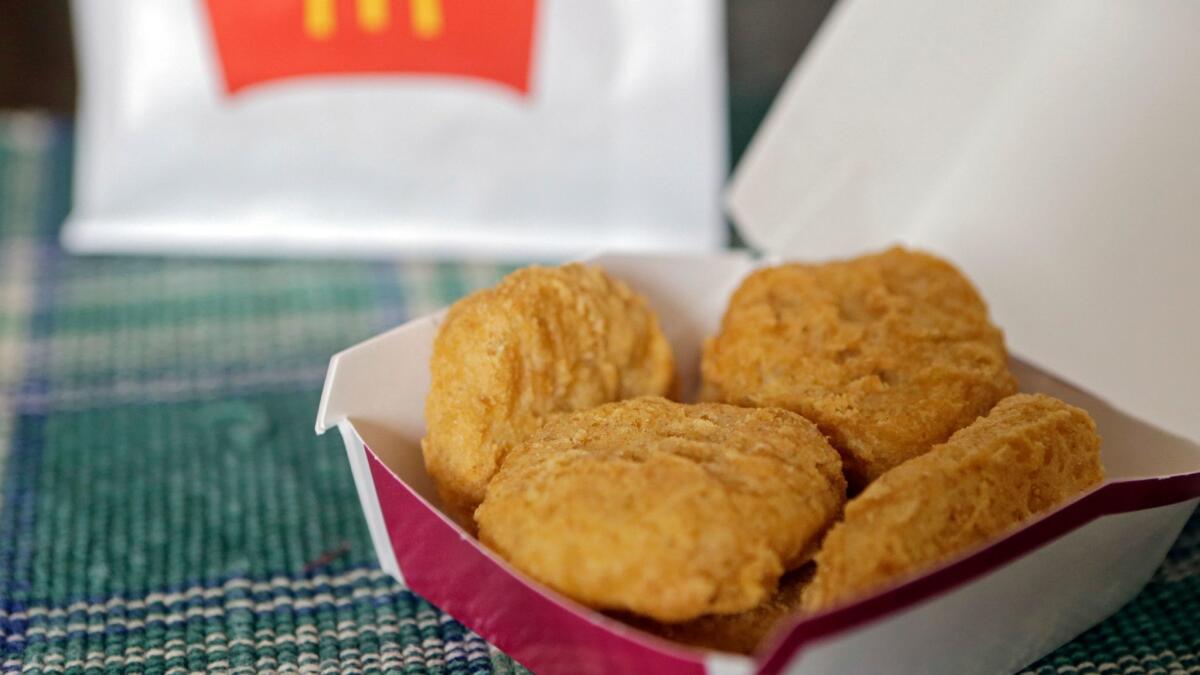McDonald’s expands its move away from antibiotics in poultry

McDonald’s said Wednesday that it is broadening its move away from serving chicken fed with certain antibiotics.
The fast-food titan said it will no longer buy chicken raised in other countries that has been treated with antibiotics also used by humans and deemed important to fighting serious infection. Two years ago, McDonald’s announced a similar policy for its U.S. suppliers.
Routinely feeding antibiotics to animals raised for food has been linked to the surge in resistant strains of bacteria that cause serious human illnesses and are blamed for about 23,000 deaths annually and $20 billion in healthcare costs, according to the U.S. Centers for Disease Control and Prevention.
Under the new blueprint, McDonalds will stop purchasing poultry treated with a small number of antibiotics that the World Health Organization has said often are the only drugs available to fight serious infections in humans.
McDonald’s said it will gradually expand the policy over the next decade to include other drugs and other animal products, including beef and pork.
The transition will begin next year with chicken purchased in Brazil, Canada, Japan, South Korea and Europe, and expand the following year to Australia and Russia, the company said. A first-year exception for one type of antibiotic used by European suppliers also will be eliminated by the second year, the company said.
“We view this progress as significant milestones in our food journey, where we can achieve impactful change on a key issue, and we feel that these timelines give McDonald’s and suppliers the ability to set credible, achievable goals,” the company said in a statement.
Food and health advocates lauded the measure.
Jean Halloran, director of Food Policy Initiatives at Consumers Union, said the policy shift “could be a total game changer that could transform the marketplace given the company’s massive buying power.” McDonald’s had total revenue of $24.6 billion in 2016.
Matthew Wellington, Antibiotics Program director for U.S. Public Interest Research Group, urged the company to move quickly to implement and expand its plan.
“While we’re excited by today’s news, we also want to see McDonald’s make a strong commitment with time-bound targets for pork and beef,” Wellington said.
The company’s move away from antibiotics in its U.S. supply chain was considered an epic shift in food policy, given its enormous footprint and influence in the fast-food industry. McDonald’s since has shifted toward using eggs raised in facilities that don’t confine chickens to small cages.
That same year, California poultry producer Foster Farms began eliminating human-use antibiotics from the chicken it sells at supermarkets, following similar steps by fellow poultry giant Perdue and restaurant chains Chick-fil-A, Chipotle and Panera.
KFC joined the list earlier this year, announcing it will move to eliminate poultry raised with a broad array of antibiotics considered “important” to human health. Burger King owner Restaurant Brands likewise expanded an earlier pledge to avoid buying poultry fed with antibiotics.
Follow me: @LATgeoffmohan
ALSO
Amazon-Whole Foods deal gets blessing from FTC and shareholders
Wal-Mart and Google team up on voice-activated shopping, challenging Amazon
‘Not one drop’ of Poland Spring bottled water is from a spring, lawsuit says
More to Read
Inside the business of entertainment
The Wide Shot brings you news, analysis and insights on everything from streaming wars to production — and what it all means for the future.
You may occasionally receive promotional content from the Los Angeles Times.











